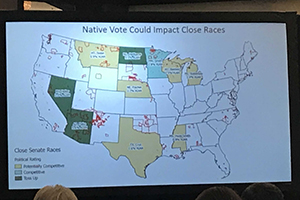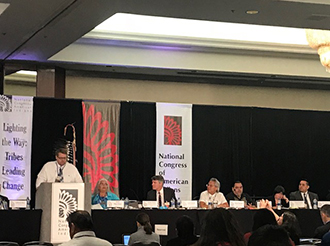It was an honor to attend the National Congress of American Indians (NCAI) mid-year conference in Kansas City with 800 tribal council chairpersons, legislators and national leaders.
NCAI is the longest-standing and most deeply representative tribal government organization in the country for American Indian and Alaska Native communities. The dynamic assembly of elected and appointed leaders happened in close proximity to our Travois headquarters.
Kansas State Representative Ponka-We Victors (Tohono O’odham Nation of Arizona and Ponca Tribe of Oklahoma) welcomed the assembly, highlighting the need and power of the Native Vote. Representative Victors shared a recent Kansas victory she led to protect tribal regalia rights. The NCAI president and Lieutenant Governor of the Chickasaw Nation of Oklahoma, Jefferson Keel, greeted Mayor Sly James of Kansas City, Missouri, and masterfully presided over the assembly for four days.

Zach Pahmahmie, vice chair of the Prairie Band Potawatomi Nation, is an NCAI area vice president representing the Southern Plains. He joined the regional leaders on stage and reported, “attending NCAI allows tribes the opportunity to share ideas to common challenges that affect our communities. Also, this exchange of ideas allows for greater unification as we work together to find opportunities to assist one another in accomplishing our own goals and strategies for self-determination.”
In additional to tribal council responsibilities for the nation, Zach also serves as chairperson for the board of directors of Prairie Band LLC. He was one of the Travois annual conference presenters who recently engaged Native communities around the potential to build inter-tribal partnerships for food sovereignty and sustainable, responsible, impact (SRI) investments. Zach is also an advocacy fellow with the Sunflower Foundation and a supporting member of the Kansas Inter-Tribal Health Committee.
Zach valued the NCAI decision to come to the heartland. He shared, “having NCAI in Kansas City was a first for the organization, which allowed us to showcase our region, and it allowed PBPN to share with tribes from other parts of the country our experiences of growing our system of governance, as some requested tours of our reservation.”
If you would like to learn more about the work of NCAI and how they use data to inform policy around issues of rural broadband e-connectivity, water infrastructure, and international advocacy to protect tribal sovereignty, visit NCAI online.


